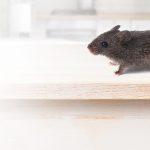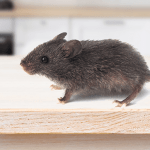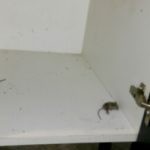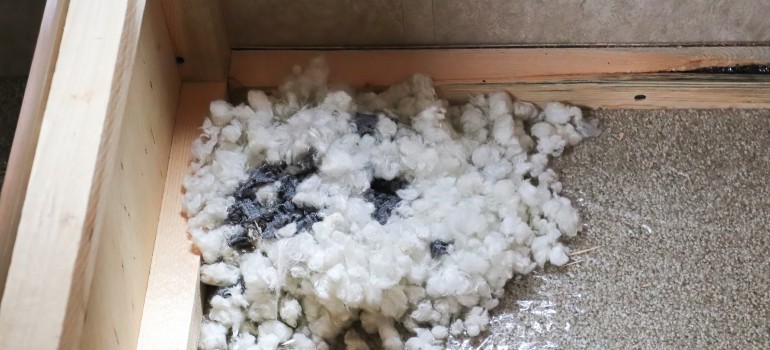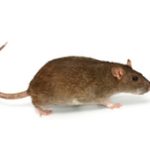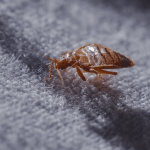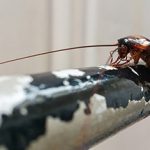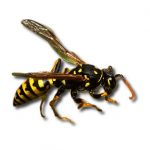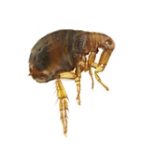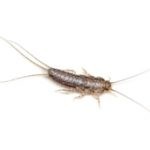How to Clean Mouse Droppings Safely
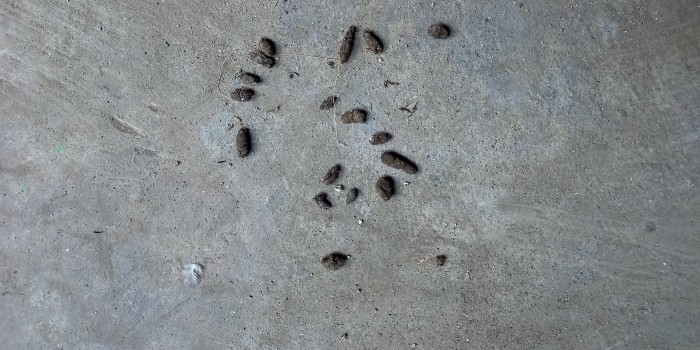 Image by: Hanni sunnatul khusna/Shutterstock
Image by: Hanni sunnatul khusna/Shutterstock
Handling mice droppings safely is one of the most concerning aspects of mice infestations. The feces and urine of mice, may contain pathogens such as Hantavirus and Salmonella.
If not cleaned correctly, mouse droppings and urine can transmit bacteria and viruses into the air. It is essential to clean mouse droppings properly to maintain a safe and hygienic home.
These simple steps can help you eliminate mouse poop from your living space, prevent diseases from spreading, and mice-proof your house.
What Do Mouse Droppings Look Like
Mouse droppings are about 3-6 mm long and black in colour. Droppings of mice are shaped like grains of rice with pointed ends and have a dry, crumbly texture when old but appear soft and shiny when fresh. Mouse poop is often found in cupboards, along skirting boards, in pantries, behind appliances and near mice nest. Large accumulations suggest an active infestation, and their presence indicates frequent mice activity.
Rat droppings are significantly larger, usually 10-20mm in length, with blunter ends. While mouse poo is often scattered in high-activity areas, rat droppings tend to appear in clusters or specific latrine sites.
Mice Dropping vs. Rat Droppings
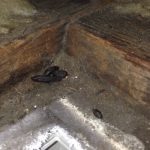
As mentioned above, mice droppings are distinguishably smaller than the rat ones; about half the size. They are different in shape and texture, too. Mice poop looks a bit crunchy, while the rats are sausage-shaped and appear soft and wet. The second type you can find again into small bunches that contain around 40-50 droppings. To sum it up: mice poop more frequently and produce more “brown presents”, while rats are exactly the other way around. Check also: Differences between mice and rats
Why Do I See Mouse Droppings but No Mice?
Since mice are nocturnal and tend to hide, finding droppings without seeing any mice is common. Nesting areas may be hidden in walls, attics, or behind appliances, with mice only coming out for food. A single mouse can produce between 50 and 75 droppings per night. Droppings are much more likely to be found in this large quantity than mice themselves, so you’ll likely encounter them more often.
Also, it is possible that the droppings are those of mice that have already left or been eradicated. If mouse droppings are appearing frequently, you may still have an active infestation that requires mice traps or pest control.
Seeing Mice but No Droppings
When you see a mouse but don’t find any droppings, you may be dealing with a very early infestation. If mice have only recently entered, they might not have left significant droppings yet. Mice may also poop in concealed areas like wall voids or insulation. Seeing a mouse is a clear sign of an infestation even if you haven’t found any droppings.
To be on the safe side, we advise you to set a mouse trap and to keep an eye for any other signs of infestation like gnaw marks on food packaging, torn paper, footprints of mice with four-toed fronts and five-toed backs and suspicious sounds. If you manage to corner a mouse, don’t attempt to grab it as it can bite you. Although not that painful, mouse bites also hold the risk of transmitting diseases.
Do Mouse Droppings Carry Disease
Can a person get sick from mouse droppings? Yes, the droppings of mice can indeed transmit a variety of diseases to humans. Mice poop may harbour bacteria, viruses, and parasites, which can be transmitted through direct contact, inhalation of contaminated dust, or consumption of food that has been exposed to the droppings.
Mice droppings can transmit numerous dangerous diseases, such as:
- Hantavirus is one of the most dangerous diseases that can be contracted from mouse droppings. Inhalation of particles from mouse urine, saliva, or faeces can cause severe respiratory distress and, in extreme cases, death.
- Hemorrhagic Fever with Renal Syndrome (HFRS) is not directly caused by mouse poo, but mouse droppings can play a role in its transmission. HFRS is caused by hantaviruses, primarily carried and spread by rodents, including mice. The disease is transmitted to humans through exposure to infected rodents or their faeces and urine.
- Salmonella, often found in mouse droppings, can cause food poisoning in humans. This infection leads to gastrointestinal symptoms, including diarrhoea, fever, and abdominal cramps, and can be particularly dangerous for young children, the elderly, and those with weakened immune systems.
- Lymphocytic Choriomeningitis Virus (LCMV) can be transmitted through mouse droppings, urine, and saliva. This viral infection can cause symptoms such as fever, headache, nausea, and, in more severe cases, meningitis and encephalitis.
If you have been exposed to fresh mice droppings from an infected mice, there’s a possibility that within 1 to 8 weeks you will develop Hantavirus symptoms, such as fever, muscle pain, especially in the hips, thighs, and back and fatigue.
Additional hantavirus symptoms include headaches, dizziness, chills, nausea, vomiting, diarrhoea, and stomach pain. If the illness isn’t caught early, it could lead to HPS – a deadly syndrome that causes your lungs to fill with fluid.
It’s best to book a professional mouse exterminator to clean pest waste and rodent droppings.
Where Should You Look For Mice Droppings?
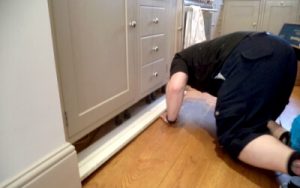
A mouse is a nocturnal creature that prefers to stay hidden during the day. Their droppings, however, can provide key clues to their presence. Controlling and preventing infestations requires identification of areas where mouse droppings are found. Here’s where you should look for mouse poop:
- Inside or on cupboard tops;
- Along the skirting;
- Under appliances;
- Behind furnishings;
- Inside drawers;
- Near electrical wires;
- In your garage;
- In your garden.
How to keep mice out of your car engine compartment.
What Should I Do if I Find Mouse Droppings?
Do not touch mouse droppings with bare hands. If you come into contact with mice poo, wash your hands thoroughly with soap and water. Always wear gloves when cleaning up droppings to minimise the risk of contamination.
Don’t panic or immediately sweep or vacuum mice droppings. Open the windows for at least 30 minutes to ventilate the area. When cleaning mice droppings in a confined space, such as an attic or basement, make sure the area is well ventilated. Allow fresh air to circulate and reduce airborne particle concentrations by opening windows and doors. Don’t sweep or vacuum the area, as this may stir up harmful dust and particles.
Guide to Cleaning Mouse Droppings Safely
Preventing diseases from spreading requires safe cleaning of mouse droppings. For effective mice feces cleaning, follow these steps:
- Spray a strong disinfectant directly onto the mice droppings, urine spots, and nesting materials. You can spray the mouse droppings with one-and-a-half cups of bleach to a gallon (4.5 litres) of water (a 1 to 10 ratio) – do this before starting the cleaning process. Allow it to sit for at least 5-10 minutes to kill bacteria and viruses.
- Use paper towels or disposable rags to carefully pick up the mice poop and soiled debris. Then place everything into a sealed plastic bag.
- Once the mouse droppings are removed, thoroughly clean all nearby surfaces, including floors, kitchen cupboards, countertops, and air vents. Use a fresh batch of disinfectant to wipe down these areas.
- Place all contaminated materials, including gloves and rags, into a double-layered plastic bag. Seal it tightly and dispose of it in an outdoor bin with a secure lid.
- After handling mouse poop, wash your hands thoroughly with antibacterial soap and warm water. If your clothes came into contact with droppings, wash them separately in hot water.
Keep monitoring and trapping mice for at least a week to ensure the infestation has been controlled. HEPA vacuum cleaners are ideal for removing fine rodent allergen particles after wet cleaning. Additionally, air purifiers with HEPA filters helps remove airborne contaminants in mice-infested areas.
Furthermore, finding and identifying the mouse droppings is every bit as important as the cleaning precautions. Any home that has gone through a mice infestation needs to be thoroughly cleaned and inspected for mouse droppings and nests.
How to Clean Mouse Droppings from Fabric
If mice droppings have contaminated your bedding, clothing, or even your offspring’s favourite stuffed animals, you should immediately wash them with hot water and a laundry detergent of your choice. However, don’t forget to use rubber or latex gloves when handling the soiled items and always set your dryer to 45℃ to render the hantaviruses inactive.
In case the mice have done a number two on your furniture or carpet, it’s highly recommended to thoroughly wash those with either a disinfectant, a commercial steam cleaner, or a shampoo.
As for desecrated books or important documents, simply wipe the mouse droppings off with a cloth and a bit of disinfectant and leave the items in direct sunlight for several hours. The reason for this is simple – hantaviruses can remain active for up to three days under normal conditions, but they will become inactive when exposed to ultraviolet rays for a prolonged period of time.
The best solution for the mouse poop problem is to attack the source, of course. No rodents mean no droppings. We advise you to opt for e professional exterminator. The experts will end your troubles quickly and efficiently. And when it comes to the task of cleaning the excrements, you can also turn to a professional. After all, nobody likes to deal with disgusting things like mouse poop.
We share helpful information according to the experience and know-how of the pest technicians. However, we don’t provide any medical advice.



